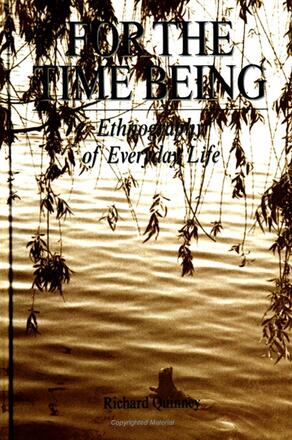
For the Time Being
Ethnography of Everyday Life
Alternative formats available from:
Through the sharing of one man's life and photographs, this ethnography of human existence covers religion, philosophy, literature, the environment, visual arts, music, drama, literary criticism, sociology, and the psychology of self.
Description
This book from start to finish is a study in the passing of time. And it is the passing of the writer in the course of time. We who remain as readers—you and I—imagine another time and another place. We then move on to what is to come next.
An artifact of a lived experience, this is a document of a life lived in the course of a decade. The writing—the process of writing—was part of the living. In some cases, the writing was the living, and made the living possible.
Throughout the book are lines from W. H. Auden's oratorio poem titled "For the Time Being. " As a mantra that runs through the book: The time being is all the time we have. It is the most trying time of all. We seek daily to redeem it from insignificance. Thus the attention given to this everyday life.
There is little concern here for the boundaries of disciplines. An ethnography of human existence, an existence itself beyond boundaries, necessarily covers the territory of religion, philosophy, literature, the environment, visual arts, music, drama, literary criticism, sociology, and the psychology of the self. In other words, disciplinary boundaries are broken and transcended. Just as in real life, just as in autobiographical ethnography.
Quinney ends this journey with a requiem, a requiem for the living and the dead. The hope is that one has lived a good life. In some ways the requiem is a reprise of what has gone before. It is a mediation of this life, a reflection and a source for the life that remains. Even as we live this moment, a requiem is playing in the background. A music that assures us that we live, and a music that makes us grateful for this life. This everyday wondrous life. For the time being is everything.
Richard Quinney is the author of many books in sociology and social theory including The Social Reality of Crime, Providence, Social Existence, and most recently Journey to a Far Place: Autobiographical Reflections. He has been professor of sociology at several universities and a Fulbright professor in Ireland.
Reviews
"The topic of this book is extremely significant, it builds and enriches ethnographic methodology, it teaches the value of journals, and provides academic materials for anthropology, sociology, the environment, religion, peace, and masculinity studies. Fascinating to read, it demonstrates the linkages between people's biographies and their current ways of living.
"It covers a long journey between a father's life and his son's professional. The photographs provide rich visual sociological insights into the text. The use of literature, including poetry, narrative fiction, and biblical and other religious texts, gives a rich intellectual foundation to the writer's photographic ethnography. " — Martha K. Huggins, Union College
"I most like the feeling this book leaves me with, of serenity, of being at peace with myself and with the world. The concerns and anxieties Quinney expresses are very much like my own, and common to academicians particularly, although the concerns and anxieties apply to humanity broadly. I think many readers, particularly so-called high achievers, would find this book hard to put down and extraordinarily comforting to read. Quinney offers us company in our stress and existential suffering and continual relief as we join him on a journey through life we share with him. " — Hal Pepinsky, Indiana University